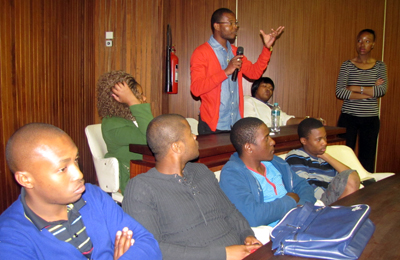 |
Lively debates and conversations as students discuss the topic of gender in the 21st century.
28 August 2013
Photo: Linda Fekisi |
Students gathered at the CR Swart Senate Hall for the second Nkanyezi Talk @UFS dialogue session. Nkanyezi Talk @UFS is a student initiative that gives students a platform to voice their thoughts and ideas about issues affecting them during and after their university life.
The August-inspired topic, Gender in the 21st century, focused mainly on women. The talk looked at women in the workplace, the role that the media plays in redefining women and how South Africans can integrate the works of theorists on gender into their everyday lives.
A panel of guest speakers included Ace Moloi, former news editor of the Irawa student newspaper at the University of the Free State and News24 contributor, Leah Molatseli, an associate attorney at Phatshoane Henney Attorneys, and Bongi Tsoleli, who is the chairperson of a portfolio in the Free State Legislature.
“We need to take own initiative as students. We need to understand what they want, as well as the issues they are confronted with,” says Bongani Zwane, founder member of Nkanyezi Talk.